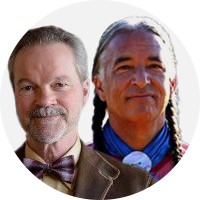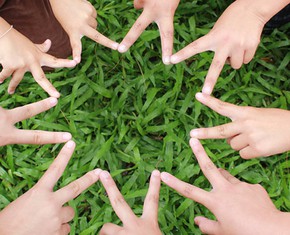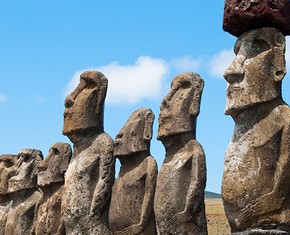The views expressed in our content reflect individual perspectives and do not represent the authoritative views of the Baha'i Faith.
So far, in this series of articles, we have offered some information on Indigenous messengers of God. Messengers give messages and mandates for people to follow.
In this installment in the series, we’ll go ahead and talk about the road ahead, and explore what those messages ask us to do to make this world a better place.
In the Baha’i teachings, Baha’u’llah calls upon each of us, especially Baha’is—both individually and institutionally—to be “an upholder and defender of the victim of oppression” and “an ensign of the hosts of justice:”
Be generous in prosperity, and thankful in adversity. Be worthy of the trust of thy neighbor, and look upon him with a bright and friendly face. Be a treasure to the poor, an admonisher to the rich, an answerer to the cry of the needy, a preserver of the sanctity of thy pledge. Be fair in thy judgment, and guarded in thy speech. Be unjust to no man, and show all meekness to all men. Be as a lamp unto them that walk in darkness, a joy to the sorrowful, a sea for the thirsty, a haven for the distressed, an upholder and defender of the victim of oppression. Let integrity and uprightness distinguish all thine acts. Be a home for the stranger, a balm to the suffering, a tower of strength for the fugitive. Be eyes to the blind, and a guiding light unto the feet of the erring. Be an ornament to the countenance of truth, a crown to the brow of fidelity, a pillar of the temple of righteousness, a breath of life to the body of mankind, an ensign of the hosts of justice, a luminary above the horizon of virtue, a dew to the soil of the human heart, an ark on the ocean of knowledge, a sun in the heaven of bounty, a gem on the diadem of wisdom, a shining light in the firmament of thy generation, a fruit upon the tree of humility. – Baha’u’llah, Epistle to the Son of the Wolf, pp. 93-94.
Q: So Kevin, with this passage from Baha’u’llah in mind, taking the Lakota people as just one example among Indigenous tribal peoples, can you summarize the oppression they have suffered historically?
A: I briefly describe the oppression the Lakota people have suffered in my book Arising:
The Lakota had formerly lived as eagles. They had handled their own material and spiritual affairs, and they had taken pride in their thriving communities and vibrant culture.
However, the Lakota have been forced to live as crows for generations. One treaty after another relocated entire populations, placed community land in the hands of the government, and stripped the community of its resources. Longstanding patterns of destabilizing the Indian way of life have prevented entire communities from making material strides and realizing their spiritual prosperity. The legacy of oppression persists.
Today, the poorest counties in the country, as identified by the census bureau, are here in South Dakota. According to the Pew Research Center in 2014, the poverty rate is a little over forty-three percent—almost triple the national average. – Kevin Locke, Arising.
Q: What about today? Is the oppression now a different complex of problems? What are they, in brief? Is the present-day oppression really the outcome—the aftermath, legacy, and ramifications—of past oppression? If so, how can the present and future make up for the past?
A: Yes, it has taken many generations of systematic and calculated oppression to arrive at our current impasse. The deeper we proceed into the morass, the clearer it becomes that nothing short of divine intervention—and our efforts to bring God’s will for peace, harmony and justice to prevail after centuries of oppression—will create a way forward. This is how our collective efforts can ensure that the present and future can make up for the past. In this, the dreams, hopes and prayers of our long-suffering ancestors can be realized and fulfilled by current and future generations, energized and activated by a vision of a bright horizon.
Q: That which was lost can never be restored. If that’s true, would you agree that the best redress for past oppression is to address current problems, and to take concerned and concerted action accordingly?
A: I believe that many things lost can be restored. To give a general idea, let me relate a story from Arising:
I met Andres Jachacollo for the first time in 1982 when he came to speak at the nutrition center in Little Eagle. He had come from Bolivia with several others from Panama, Chile, and various parts of Bolivia, as part of the Trail of Light initiative—an effort of the Baha’i community to reinforce cultural and spiritual connections between the Indigenous people of the Americas.” …
Though he was short of stature, Andres had a commanding presence. “My dear relatives,” he began, beaming out over the crowd. “I have come a long way to see you. I see in the faces of all who have gathered here my own nieces and nephews, my children and grandchildren. Though we have been separated for so long, we are closely related.”
“Yet,” he continued, “as I look upon you, I see how sad you are. You have suffered greatly in your lives. For generations, your ancestors have suffered and your people have been downtrodden. Your spirits have grown dim.”
He paused. “But today—today is a day to rejoice because God has come to lift us up. God has come to restore our dignity and to enable us to become happy. He has come and given us the great task to recreate the world, to bring light, beauty, and happiness to all of mankind. He has given us the task to make the world into a garden. Our ancestors have prayed and hoped for this day to come.”
I absorbed his every word, spellbound. I looked around me to see if the others in the audience were as touched by Andres’ speech as I was. This man from Bolivia was speaking with such conviction about the experiences of Indigenous people everywhere. His words bore great certitude that the time had come for the redemption of the Indigenous peoples of the Western Hemisphere. –Ibid.
Q: So, with that in mind, how can we each become “an upholder and defender of the victim of oppression”?
A: We can stand up for the rights of individual victims and also focus on ameliorating the root source of oppression—by shining a light in the darkness and advocating and actively promoting the spiritualization process, both individually and collectively, including among the Lakota people.
Q: Similarly, how can we be “an ensign of the hosts of justice”—individually and institutionally?
A: An ensign is a flag or banner. To be “an ensign of the hosts of justice” one must truly distinguish themselves and be in the forefront of the forces of justice, just as past armies carried their ensigns into battle. Frankly, in my view, the most direct way of carrying out this injunction involves Baha’i-inspired children’s classes and junior youth spiritual empowerment programs in Indigenous populations, including among the Lakota people.
Q: Furthermore, how can we be “a balm to the suffering”—individually and institutionally?
A: All of these divine injunctions from the Baha’i teachings require us to transcend self-aggrandizement and to hone our ability to serve the best interests of humanity collectively. Each of us have different God-given abilities and capacities, and can endeavor to develop our own most efficacious mode of service to humanity.
Q: How can we, moreover, be “a treasure to the poor, an admonisher to the rich, an answerer to the cry of the needy”—individually and institutionally?
A: In my personal experience, my mother—the late Patricia Locke—best exemplified these traits. I think her method was to constantly reflect what she could do to better any and every given situation and condition. Through her constant attention she was able to upraise standards of justice broadly and effectively.
Q: So, in short, can we be “a joy to the sorrowful,” as Baha’u’llah wrote—both individually and institutionally—by doing what you have outlined above?
A: Absolutely!
















Comments
Sign in or create an account
Continue with Googleor